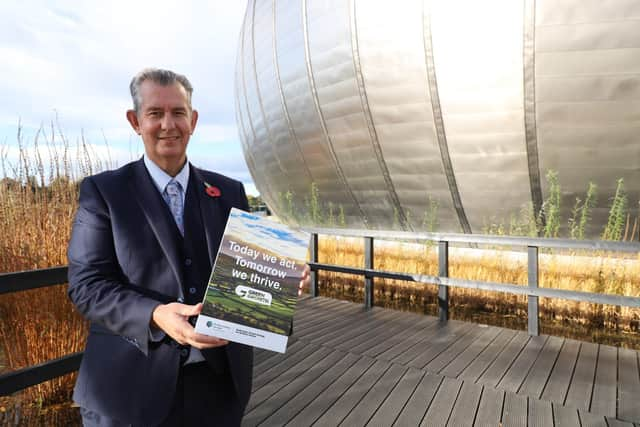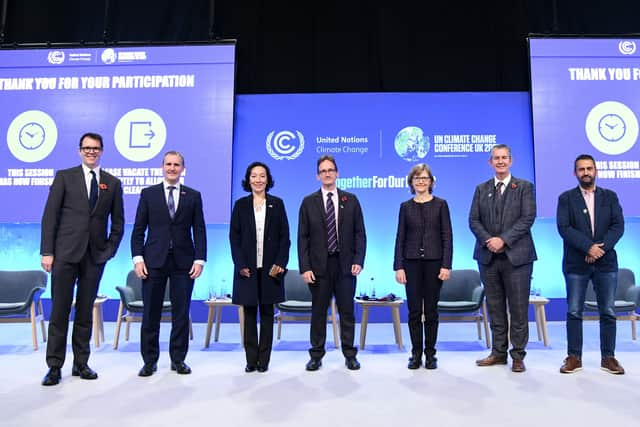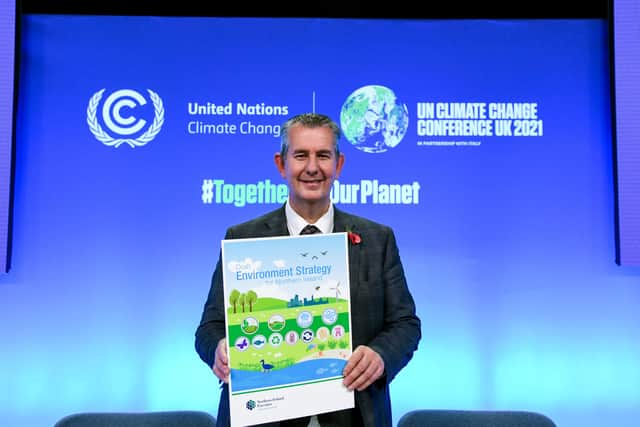What is in COP26 agreement for farming in NI?


And, front in centre in this regard, is the global commitment now in place to have methane emissions slashed by 30% come 2030.
And just in case there might be some confusion in this regard: 2030 is not 2050 and it’s only eight years hence. So the clock is ticking. . . and big time.
Advertisement
Advertisement
And how is this going to shake down for agriculture In Northern Ireland? Very badly, methinks.


The likes of Russia, the US and China have more than significant natural gas industries. It’s thought these countries need only tweak emissions from this - and other fossil fuel-related sectors - and this gets them over the line.
Meanwhile, Ireland has a farming industry . . .and that’s about it. So, in our case, front and centre, will come the well practised arguments from all of the ‘do gooder’ environmentalists, vegans and vegetarians to the effect that the only show in town is to substantially cut cattle numbers.
Agriculture Minister Edwin Poots has previously stated that he does not foresee the need to reduce ruminant animal numbers as part of our response to climate change.
Advertisement
Advertisement
So it will be interesting to see how he squares the circle, given the news that came out of Glasgow last week.


I am not that good with figures but I sense that if were to remove all the old ladies – dairy and suckler – with bad feet, high cell counts and fertility problems, and not replace them, we would still be well short of the 30% methane reduction target now in play.
And what happens then? Are we really looking down the barrel of a significant cattle cull in this country?
Of course, our farming leaders should have seen this coming. Up to this point, they have played a very bad hand at reacting to events, rather than taking the issue by the scruff of the neck and pushing forward with a narrative that tells the real story of what’s happening within Irish agriculture.
Advertisement
Advertisement
The fact is that Northern Ireland is home to the most efficient dairy, beef and sheep industries in the world. All of this is being driven on the back of a real ability on the part of our farmers to secure real animal performance from grazed grass.
No other region of the world can match us in this regard: not even the much vaunted New Zealand, where farmers there increasingly rely on irrigation to deliver, so called, ‘pasture growth.”
Northern Ireland’s best kept secret must now be unveiled to the world – in a more than meaningful way! And at the risk of repeating myself: the clock is ticking!
And now for a quick rant!
I have been a regular visitor to the COP 26 website over recent weeks. One of the aspects to it that jarred with me from the outset was the fact that the site’s pages were festooned with the logos of numerous multi-national corporations, all deemed to be ‘principal partners’ in the event.
Advertisement
Advertisement
Let me name four of them: Unilever, Sky; Microsoft and Hitachi.
I think it’s worth giving the magnitude of all this a little bit of thought. Last time I checked, the threat of global warming will impact everyone on this planet. Yet, courtesy of its actions the UK government is giving all these overtly commercial organisations the opportunity to suggest that they could be part of the solution!
Everyone involved in the organising of the COP 26 will, no doubt, claim that I am barking up the wrong tree. But I’m not: the impact of subliminal advertising has been known about for generations.
Otherwise, why would these aforementioned commercial organisations want to throw their money towards the Glasgow summit in the first place?
Advertisement
Advertisement
In my opinion, getting into bed with commercial sponsors was a total abandonment of the UK government’s moral obligations, where climate change is concerned.
London has just spent £billions keeping the UK economy afloat throughout the period of the Covid-19 pandemic. So I assume that the money was available within the Whitehall coffers to cover the actual cost of hosting a reasonably comprehensive COP 26 website, without the need for commercial sponsors getting on board at all.
So here’s the real question: why did the UK government feel the need to get into bed with big business, in the first place, when it come to communicating the details of an event, the outcomes from which will determine the future of all humanity?
I sense this has everything to do with the way that the real movers and shakers in London go about making decisions across so many areas of government policy today.
Advertisement
Advertisement
Think tanks seem to hold the upper hand in so many of these matters. And who is funding these so called think tanks? Answers on a post card please!
But it’s not all bad news. During the recent finals of the UEFA European Championships Cristiano Ronaldo took part in a very well profiled press conference. As he was taking his seat, the renowned footballer moved two very prominently placed bottles of Coca-Cola to one side. While doing this he was heard to say ‘agua’.
This one simple word wiped US$millions from Coca-Cola’s share price within a very short period of time. I rest my case.
But let’s get down to business: what has actually come out of COP 26 that will truly resonate with agriculture in Northern Ireland over the coming decades?
Advertisement
Advertisement
Ulster Farmers’ Union (UFU) president Victor Chestnutt believes UK agriculture is a uniquely versatile sector, which supplies food, captures and stores carbon and helps to generate clean energy.
In other words, it is a key part of the climate change solution.
This message was highlighted repeatedly by all the UK’s farming unions throughout the COP 26 event.
Heis quick to point out that local farmers are already contributing significantly to the UK target of net zero by 2050. However, he recognise this can be improved further with the right policy backed by scientific evidence.
Advertisement
Advertisement
In other words, it is essential to continue making positive progress in combating climate change here in NI and the UK as a whole, supporting local farmers to play their vital part without lessening their ability to produce quality, sustainable products to world leading standards.
On his return from the Glasgow event farm minister Edwin Poots MLA said that COP26 had encouraged world leaders, governments and officials, stakeholders and industry leaders to pause, reflect and work together to chart the way forward to deal with the ever increasing problem of climate change.
He added:“The energy and enthusiasm for change from everyone I met at the two-week event,was not only encouraging, it was inspiring – but we must capture that momentum and ensure that our actions speak even louder than our words.”
According to Poots, Northern Ireland may be small in global terms, but the region has a substantial part to play in helping to make our planet healthier. And all of this starts at home.
Advertisement
Advertisement
He explained: “Since coming into office in 2020, I’ve progressed a number of initiatives that have environmental considerations.
“I launched the Forests for our Future programme which pledges to help tackle climate change by planting 18 million trees over the next 10 years: 10 for every person in Northern Ireland.
“This includes reopening two forest grant schemes designed to support farmers and other private and public landowners to plant new woodland.
“These will benefit individuals, community and society by contributing to a healthy, quality environment, and capture carbon from the atmosphere as they grow for future generations.
Advertisement
Advertisement
“I published the DAERA Science Strategy Framework, which will guide and direct how the Department will utilise science over the next 15 years in delivering services,and also launched the Department’s Innovation Strategy 2021-2025, which aims to develop an innovation ecosystem.
Poots referenced DAERA’s Plan to 2050, which sets out the long term vision to ensure Northern Ireland has a healthy environment, healthy economy and healthy population.
He continued: “I also recently launched the new Future Agricultural Policy Framework Portfolio for Northern Ireland which aims to boost efficiency and resilience whilst enabling a decrease in the agri-food industry’s environmental footprint and creating the means to enhance our natural assets and address climate change.
“And I will soon launch a consultation into the details of this framework.”
Advertisement
Advertisement
In addition to what has already been launched, the Stormont Executive has also consulted on a range of other upcoming strategies such as the Northern Ireland’s first Clean Air Strategy discussion document, the draft Northern Ireland Peatland Strategy 2021-2040, the draft Northern Ireland Food Strategy Framework and a Call for Evidence on a Plan to Eliminate Plastic Pollution. Work on these consultations is progressing at pace.
Mr Poots continued: “Here in Northern Ireland, there have been a number of developments and announcements over the last few weeks and months that will help us to navigate our way forward. One of the most significant was the launch of the Executive’s draft Green Growth Strategy.
“This cross-cutting multi-decade Strategy will set out the long-term vision and a solid framework for tackling the climate crisis by balancing climate action with a clean environment and the economy. It would ensure that new policies and programmes align with the need to address climate change, develop green jobs and address biodiversity commitments.
“The other significant development was my draft Climate Change Bill passing its second stage in the Assembly.
Advertisement
Advertisement
“Based on science and evidence, my Bill will strike the right balance between safeguarding the environment, the economy and society. Northern Ireland will play its full part in reaching the wider UK targets reach UK net zero by 2050, if not before.
“We’ve set ambitious targets and plans, but I’m also aware of the fact that technological advances over the next decade, may in fact help us to move quicker on those targets to cut carbon emissions by at least 82% by 2050. If the science, innovation and expert advice allows, I will seek to go further.”
While attending COP26, Poots also launched a consultation on Northern Ireland’s first ever Environment Strategy. According to the minister, this strategy will form the basis for a coherent and effective set of interventions that can deliver real improvements in the quality of our environment.
He concluded: “This will also improve the health and well-being of all who live and work here; create opportunities to develop our economy; elevate Northern Ireland to an environmental leader; and enable us to play our part in protecting the global environment for many decades to come.
Advertisement
Advertisement
“There is no doubt that the journey ahead will be hugely challenging and complex for individuals, businesses and governments.
“On the one hand, we all understand the urgency that’s needed to tackle this issue and the commitment it is going to take, however the road ahead is a long one and it will require step change and strong leadership from civic and political representatives.”